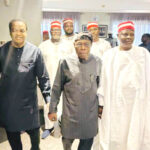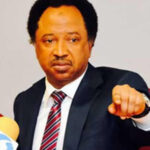The road to a one-party system beckons. It always has. We must not take it. It is the road to our political perdition. The one-party system, now anachronistic in modern nations absent of military rule, is anathema to political pluralism, the soul of democracy.
Its attraction for political leaders is rooted in the human inclination for political domination. We must not just resist it; we must put it to rest. Our democracy and national development rest squarely on political pluralism.
Let me lead you down the memory lane of what ought to have been in our national politics. The Obasanjo military administration recognised the importance and the place of political pluralism in our political development and national progress. It registered five political parties with claims on national spread.
The results of the 1979 election showed that it was one of the best things to happen to our national politics. Each of the five political parties controlled at least two states. It ventilated the political space and accommodated the varied political interests and groups.
NDLEA, Aisha Babangida, others blame parents over rise in drug abuse
Nigerian female soldier wins Gold at World Military Wretstling Championship
And then wahala. The NPN won the presidential election, but it controlled only seven states. The party found itself in the minority against the other four political parties that had come together under the umbrella of the Progressive Parties Alliance, PPA, to pursue the common cause of making life difficult for the president and his party.
The NPN decided to remedy this, political pluralism be damned. Before the 1983 general elections, it sowed the ill wind that would blow the other political parties into either irrelevance or out of existence. By the time we went to the polls on August 6 that year, all the other political parties had been emasculated by political infighting and factionalization. The NPN was the beneficiary of that development. Its juggernaut easily crushed them and rode into victory in all five elections.
In his transition to civil rule programme, President Ibrahim Babangida decided to approach our political pluralism differently. He said that the political tendency in the country was towards a two-party system. He decreed the two-party system into existence by registering two political parties, one, “a little to the right” and the other “a little to the left,” to accommodate the two broad political spectrums inherent in political pluralism. The wisdom of the two-party system in our country was not fully put to the test for reasons that we need not to go into here.
General Abdulsalami Abubakar, the head of state who ran the shortest transition to civil rule programme in our country, reverted to the 1979 take on political pluralism. He registered five political parties. Three of them, PDP, ANPP and the AD, gave effect to the ventilation of the political space and sustained political pluralism by offering the electorate choices beyond the two-party system. PDP won the presidential election in 1999 and became the dominant party in the country. It looked set to defy the setting sun. It failed for what former Vice-President Atiku Abubakar described as lack of internal democracy. It haemorrhaged from 2014 and lost the presidential election and yielded its dominance to the new political kid on the block, APC, in 2015.
I have gone to this length in our short political history to make the point that while we may have problems with our political pluralism, it still offers us a chance to grow our democracy in a manner consistent with its abiding principles of participation of the people in a government birthed by them. The gradual but hardly surreptitious narrowing of the political space towards a one-party system is a push that must not come to shove.
Two developments are pushing us towards the road we must not take. One, the politicians in their mad quest for power by hook and crook have narrowed our participatory democracy in the conduct of party primaries and in the elections that increasingly narrow the political space. A state controlled by one party is regarded as the special turf of that party.
The absence of institutionalised opposition in our form of government is not the death of opposition in the system. It is not the norm in nations committed to political pluralism and the expanded space it offers the people. When politicians abandon their parties for the mess of pottage in the ruling party they narrow the space of our political pluralism.
Two, the expanded role of the judiciary in our elections is pushing the nation towards the one-party system, perhaps by default. Here we are reaping the unintended consequences of the unwillingness by the politicians to play by the basic rules and norms of democracy. It is not good for our participatory democracy that choices made by the people with their ballot papers are undermined by legal technicalities with justices on the higher bench treating judgements of the lower bench with so much contempt. Almost all the losses suffered by APC at the polling booths and endorsed by the election tribunals have been reversed by the appeal court, thus giving the ruling party undue advantage in the power structure in the country. This is unusual. How can the lower bench be so wrong?
If we must halt the slide towards the one-party system, then we need to urgently do two things. One, give the power back to INEC as the primary custodian of our electoral system and the conduct of our elections. Its power to qualify and disqualify aspirants to elective offices taken away by the national assembly must be restored to it.
Two, the overarching role of the judiciary in our elections does not accord with participatory democracy. It undermines the integrity of both the electoral umpire and our elections. The judiciary is a support system in our elections. It is its business to support the laws and the rules that guide the conduct of our elections as enshrined in the electoral act 2022 and other extant laws. To ignore the act as the Supreme Court did in the case of former senate president, Ahmad Lawan, and to engage in mathematical calculation of votes in the case of Hope Uzodinma, is to ridicule the competence of INEC to conduct free and fair elections. It does the giant of Africa no good.
That role should be minimized to put an end to the embarrassment of contradictory judgements and decisions between the lower and higher benches that in the current climate, invariably favour the ruling party and its candidates. It was never intended that the judiciary should play the role it is playing now. It attained this unwanted height because the politicians removed the power from the people and handed it over to the bar and the bench. This is not the way of democracy. It is the road to political perdition in which justice is turned into a commodity for sale.
 Join Daily Trust WhatsApp Community For Quick Access To News and Happenings Around You.
Join Daily Trust WhatsApp Community For Quick Access To News and Happenings Around You.


